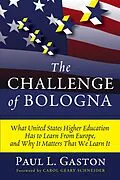In 1999, a declaration formalizing "the European process" was signed at and informally named for Europe's oldest university: Bologna. "The Bologna Process" has transformed higher education in Europe.This book is essential reading for anyone concerned about the ability of America's higher education system to position the country for competitiveness in a global economy, about its failure to broaden access and participation, or to respond to calls for accountability, and specifically about whether it is ready to address the redoubtable challenge that Bologna Process represents on all these issues. In this book Paul Gaston assesses the Process' accomplishments, weighing its strengths and weaknesses, and evaluates which features pose a threat, which we can learn from, and which may be inappropriate for our system of higher education.Bologna's achievements in making higher education more accessible, in rationalizing and making consistent the evaluation of credits, and the definition and measurement of learning outcomes for all disciplines, all constitute a major "wake-up call" for American higher education. If we consider Europeans' increased participation in higher education, their increased graduation rates, and the fact that Europe is retaining more of its students and attracting more international students, American higher education may be losing its competitive advantage. For all these reasons, it is vital that educators and policy makers understand Bologna and its implications for American higher education. It represents a formidable challenge on a matter of national priority. This book provides that understanding by offering a realistic and balanced account of Bologna's achievements, and suggesting how US higher education can constructively and effectively respond.
Autorentext
Paul L. Gaston, Trustees Professor Emeritus at Kent State University (Ohio), has served four universities as a faculty member, dean, and provost. Having offered 14 years of university service as a provost (Northern Kentucky and Kent State), he has focused more recently on teaching, writing, and consulting.His recent books include General Education Transformed: How We Can, Why We Must (AAC&U, 2015), Higher Education Accreditation: How It's Changing, Why It Must (Stylus Publishing, 2014), General Education and Liberal Learning (AAC&U, 2010), The Challenge of Bologna: What U.S. Higher Education Has to Learn from Europe and Why It Matters That We Learn It (Stylus Publishing, 2010), and Revising General Education, with Jerry Gaff (AAC&U, 2009). His most recent book prior to this one, Ohio's Craft Beers (Kent State University Press, 2017), explores alternate approaches to "higher" education.His more than 50 published articles on literature and higher education include studies of the British hymn tradition, Anthony Powell, George Herbert, the role of the provost in fund-raising, the Bologna Process, minor league baseball, accreditation reform, Il Gattopardo, interart analogies, and the cultures of futures markets. He is one of the four original authors of the influential Degree Qualifications Profile (Lumina Foundation: 2011, 2015.)He received his degrees from Southeastern Louisiana College (BA) and from the University of Virginia (MA, Ph.D.), where he was a Woodrow Wilson Fellow. He is now Distinguished Fellow at the Association of American Colleges and Universities and a consultant to Lumina Foundation. He lives in Northeast Ohio with his wife, Eileen, and two cats, Scout and Binx. For recreation, he enjoys hiking, cycling, reading, and supporting Chelsea (soccer) and the St. Louis Cardinals. His Twitter name is CardsFaninOhio. Carol Geary Schneider has been president of the Association of American Colleges and Universities since 1998.
